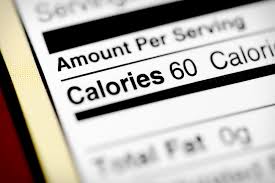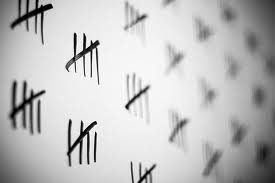You’ve heard the phrase “garbage in, garbage out”. Now I’m not suggesting that calories and garbage are related, but if you think about it metaphorically, it’s a great example that can be expressed in many ways. For example, ” you are what you eat”, or “you get out what you put in”. It also reminds me of the phrase “what you think about most of the time, you become”, because it all starts on the inside.
Let’s start the discussion with a little Q&A:
A calorie is simply a unit of energy. Nutritionally, calories refer to energy “consumption“ based on what we eat & drink. This also includes energy “usage“ through physical activity. Here’s an example: I eat a large apple every day which contains approximately 116 calories, while a 10-minute slice out of my 40-minute elliptical workout burns approximately 175 calories. This is sometimes referred to as calories in vs. calories out.
Why are calories important?
Most of us associate calories with food and drink, but anything that contains energy has calories. We need energy (calories) to survive. And we acquire this energy directly from the food and drinks we consume. Without this energy we wouldn’t survive. And just for the record, the quality and the quantity of the calories you consume matters – bigtime!
How many calories do you need?
Total Daily Energy Expenditure (TDEE) is a metric that quantifies the number of calories your body needs to consume daily to function, excluding any calories you burn during exercise. This measure is best estimated by scaling your Basal Metabolic Rate to your level of activity. But don’t try to calculate this manually. There are plenty of good TDEE calculators online. Click here and plug in your info. Your TDEE calculation is the first step in identifying your daily calorie requirements.
Does counting calories really matter?
Calories DO matter! And depending on the amount of weight you need to lose, you’re gonna be counting calories in some way. That is, if you’re serious about losing the weight and keeping it off. This includes keeping track (remember tracking?) of the calories you consume every day. You can do this easily with an app on your phone, which I’d strongly suggest, like My Fitness Pal. Although you could also use a spreadsheet to track your calories, you’re better off searching for the My Fitness Pal app on your phone.
Or you can create meal plans in advance. This approach saves time and helps you plan better since you’ll know the number of calories you’re consuming in advance. However, you may find that a combination of the 2 approaches is necessary to fit your busy lifestyle. The key is to figure out a plan that works best for you. And remember to track the number of calories you burn at the gym.
Calorie math anyone?
Macronutrient caloric breakdown:
- Protein contains 4 calories per gram
- Carbohydrates contain 4 calories per gram
- Fat contains 9 calories per gram
- Alcohol contains 7 calories per gram*
*Alcohol is obviously not a macronutrient, but the calories can add up. In the United States, a standard drink (which is usually defined as 12 ounces of regular beer, 5 ounces of wine, or 1.5 ounces of distilled spirits) contains 14 grams of pure alcohol. At a minimum of 100 calories per drink before mixers with no nutritional value, it’s easy to see why alcohol is referred to as “empty calories”.
Let’s use an example that your current TDEE (the number of calories your body needs to function) is 2,500, which is known as your maintenance level. And you’ve determined that you want to achieve a 20% reduction in your caloric consumption, approximately 500 calories per day. This means that you can expect to lose approximately one pound per week (500 calories X 7 days = 3,500 calories per week).
This calorie reduction can be accomplished in a few ways.
- By reducing the number of calories you consume by 500 per day.
- By increasing the number of calories you burn by 500 per day.
- With a combination of reducing calorie intake and increasing calorie burn every day.
I would suggest that you experiment with the online TDEE calculator to help you understand the impact that your “activity level” has and how you can maximize your results. But please realize that it’s not always that simple or exact. There are many other factors to consider including your body composition.
For one person with a lot of weight to lose, reducing 3,500 calories in a week may equate to losing 1 to 2 pounds from fat and water. Meanwhile, for another person that’s in pretty good shape, reducing the same 3,500 calories in a week may result in the loss of 1 pound or less, but possibly at the cost of some lean muscle loss. This is because your body will hold onto fat stores as you get closer to your ideal weight. And as a result of your biological “survival mechanism”, your body will sacrifice muscle over fat.
By the way, a 20% reduction in calorie consumption per day is about as high as you want to go. Otherwise, you’re cutting too many which will result in constant hunger. That’s no way to live and nearly impossible to sustain long-term. So don’t set yourself up for failure. Remember, slow and steady wins the race. Achieve big, long-term results with small, incremental positive changes.
You can do it! My goal here was to familiarize you with the basics of calories. We’ll cover this topic in more detail in a future post.
For now, start by figuring out how many calories your body needs. Think about how your activity level can influence this and accelerate your weight loss. Ideally you want to plan to lose 1 to 2 pounds per week, so set your calorie reduction goal accordingly. Develop your meal plans so you can eat clean and give your body the best possible fuel. Track it relentlessly. Learn from your wins and losses. Have some patience and compassion for yourself, but don’t settle for mediocrity or excuses. It’s not hard, but it does require effort, discipline and perseverance.
This is your one and only body so go make the best of it!


